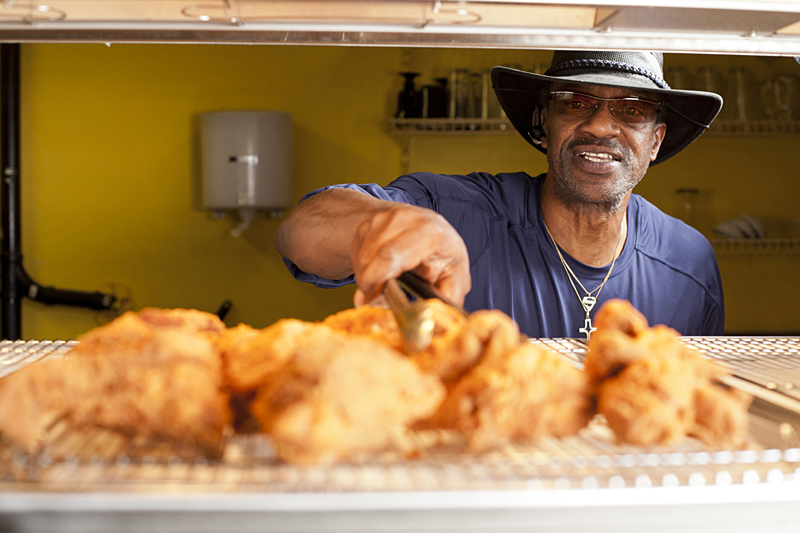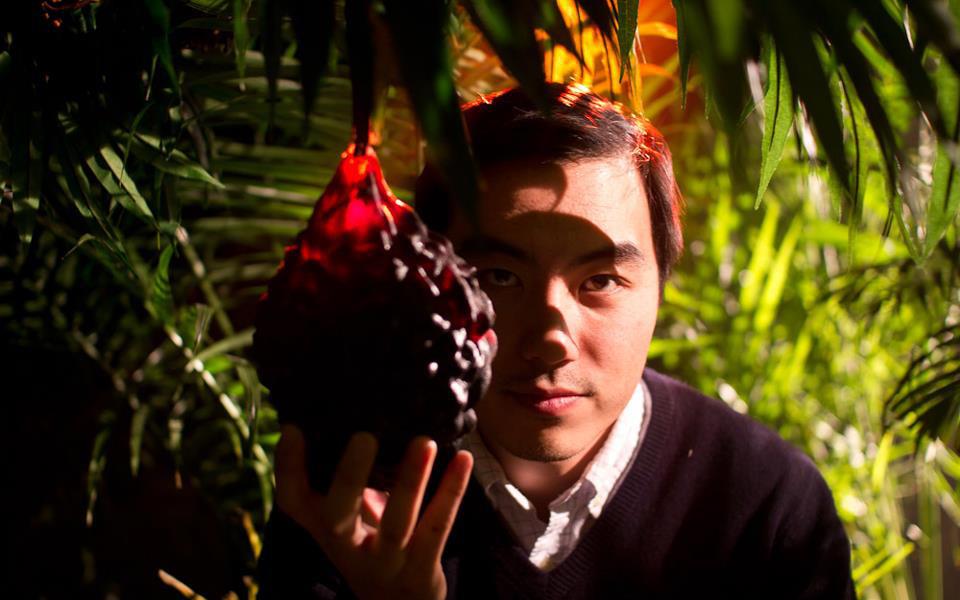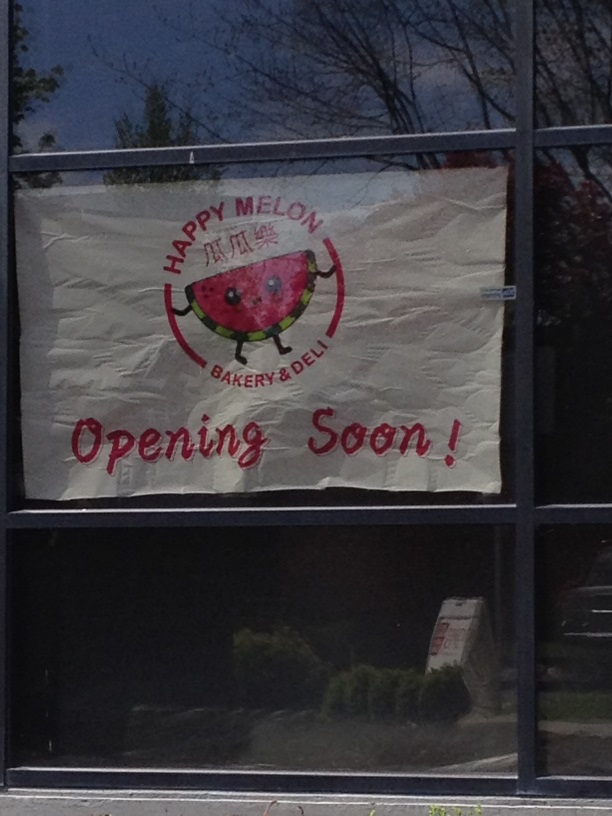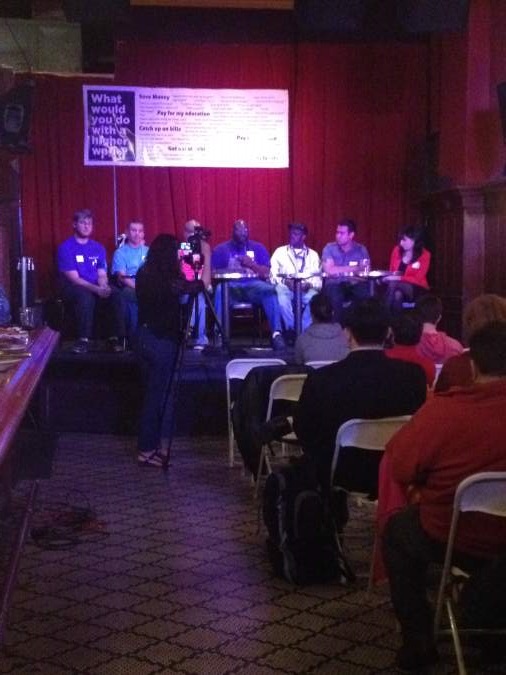The question was deceptively straightforward, posed with no more melodrama than an optometrist musters when administering an eye exam. A or B? Whaddya like?
Yet the guests at my improvised fried-chicken faceoff looked stricken, realizing their answers might reveal not only where they stood on such important matters as saltiness and skin crispiness, but also hint at something telling about their base natures.
If they sided with the drumsticks and breasts from Ezell’s Famous Chicken, the tasters could present themselves as loyalists and patriots, forever faithful to the brand that gave Seattle a speaking part in the nation’s high-cholesterol chicken pageant. But aligning themselves with the bird from Heaven Sent, the mini-chain that Ezell Stephens launched after a legal settlement shooed him from the restaurant bearing his name, would make them certifiable fans of the underdog—and, perhaps, discerning connoisseurs of chicken genius.
Although the tasters weren’t told which restaurant produced which chicken, there was little risk of confusing the entries. With the exception of an eater who confessed he prefers his chicken dry and mildly seasoned, everyone was sold on Chicken B. They praised its thick, peppery skin and poked fun at its slouchy competitor, which tasted as though it had had its last fling with freshness hours ago and was skunked with the flavor of dirty smoke.
And when the chickens’ identities were unmasked, the tasters who were rooting for Stephens’ up-from-ignominy storyline were elated. Under the banner of Heaven Sent, the chicken that made Oprah go gaga is back.
In the late 1970s, Stephens began wondering whether there was a market in Seattle for the kind of northern- Louisiana chicken he’d learned to make as a teenaged fry cook at Brown’s Fried Chicken in Marshall, Texas. He pitched the idea to his childhood buddy and brother-in-law, Lewis Rudd, who joined Stephens, Stephens’ then-wife Faye Rudd, and Stephens’ brother Sam in securing a Small Business Administration loan, which funded the opening of their store near Garfield High School. Within a few years, the restaurant was prepping the in-flight lunches served to Seattle Seahawks before away games and selling close to 2,000 pieces of chicken a day.
A chance craving for fried chicken led Winfrey to Ezell’s during a 1989 trip to Seattle. After having the chicken twice delivered to her hotel room, she raved about it on the air and arranged for 240 pieces to be served at her 36th birthday party in Chicago, alongside macaroni and cheese and sweet-potato cheesecake from Philadelphia.
Yet back in Seattle, conditions were considerably less glamorous. Oprah’s endorsement helped slow Ezell’s slide into bankruptcy, but the restaurant’s books were a mess. Financial pressures, exacerbated by the restaurant’s Christian emphasis on charitable giving and a bungled expansion into the U District, contributed to the breakup of Stephens’ marriage and fostered serious management disagreements between Stephens and Rudd. Still, as late as 1993, the men vowed to weather the crisis together.
“The two men, with tears in their eyes, hugged. Ezell whispered in Lewis’ ear, ‘We started it together, and we’ll finish it together,’ ” concluded a 4,000-word Seattle Times feature about the pair and the half-million dollars of debt they’d accumulated.
The detente lasted until 1998, when an irreparable ownership and trademark dispute erupted. As reported by Seattle Weekly‘s Rick Anderson (“Food Fight,” Feb. 9, 2011), Rudd accused Stephens of opening locations in Lynnwood and Lake City without board approval, and Stephens countered that Rudd had botched a plan to open Ezell’s in locations across the country. A lawsuit filed last year was settled out of court; though the terms weren’t publicly disclosed, Stephens says he’s allowed to fry chicken according to his recipe so long as he doesn’t use his name to sell it. Ezell’s was permitted to keep the recipe too.
Earlier this year, Stephens opened his fourth Heaven Sent outlet, coyly tagged as the “same great chicken with a new name.” The Rainier Valley restaurant, his first in central Seattle, is housed inside Willie’s Taste of Soul, in an arrangement that a biology teacher could use to illustrate symbiosis. Stephens and his pal Willie Turner, who five years ago moved his smoker down from Beacon Hill, haven’t merged operations—customers are asked to declare whether they’ve come for barbecue or chicken before they place their orders so cashiers can position themselves at the correct register—but they share the kitchen and plainspoken dining room.
The tile-floored eating area, with walls painted ketchup red and mustard yellow, is pleasant enough. It’s furnished with serviceable tables and chairs, a flat-screen TV, a cooler stocked with cold drinks, and a few gumball machines. But the majority of customers appear to take their fried chicken to go.
Bringing home a bucket is a grand American tradition, but if your commute involves multiple highways or a bus transfer, it’s probably not the best way to experience Heaven Sent. Fried chicken is fantastic straight from the fryer, and nearly as good served cold the next day, but it’s an enervated fright during its interim adolescence. It ages badly whether riding in a takeout bag or languishing behind the counter, which is why the luck of the clock matters at Heaven Sent.
On my first visit, I was served chicken that clearly hadn’t been fried recently. When I placed my order, the counter clerk scanned the chicken selection under a heat lamp and asked whether I’d be willing to wait for a fresh batch. Although I said I’d happily wait, she minutes later served halfway-warm chicken that implied the fry guy was on break. Time hadn’t been kind to the livers and gizzards either. None of the food was greasy, but it was hardly touchdown-guaranteeing.
Yet in its prime, Heaven Sent’s chicken is excellent. There are side dishes too—including sugary baked beans, a mustard-enhanced potato salad of cream and lumps, a yeasty roll, and a shredded coleslaw that smacks of pickle juice—but there’s no shame in skipping them. Even Oprah “best I ever had” Winfrey entrusted the fixings to another operation when she wrote her party menu.
Stephens’ chicken is battered and then battered again. Its mahogany crust is thick and flat, and hovers above the meat like a dark storm cloud. Here, the crisp skin acts as a bouncer, assertively warning eaters that if they’re turned off by the pop of cayenne, they might want to take their teeth elsewhere. But for those who press on, the reward is tremendously juicy meat penetrated by spice. Even the white meat springs rivulets of juice.
For chicken fans who moved to Seattle long after Ezell’s founding, Heaven Sent’s chicken finally explains the baffling excitement about Ezell’s Famous Chicken. Stephens’ name may belong to Ezell’s, but the man has retained full ownership of his fried-chicken gift.
Price Guide
Two-piece dinner, dark $6.65
Two-piece dinner, white $7.60
Livers $6.50/pound
Gizzards $6.75/pound








